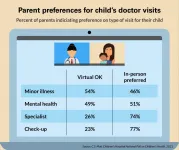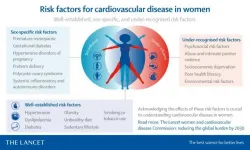(Press-News.org) ANN ARBOR, Mich. -- For children, pandemic norms have meant virtual school, holidays over Zoom and for some, even seeing the doctor from their own homes.
One in five parents in a new national poll say their child had a virtual health visit over the past year for either check-ups, minor illnesses, mental health or a follow up - a marked increase in remote care for children.
And while some parents still have reservations about using telemedicine for their kids, the majority were satisfied with the experience, suggest findings from the C.S. Mott Children's Hospital National Poll on Children's Health at the University of Michigan.
"COVID has had a major impact on the delivery of healthcare for children, both for routine check-ups and visits for illnesses," says Mott Poll co-director and Mott pediatrician Gary L. Freed, M.D., M.P.H.
"We've seen a massive expansion of virtual care, but this experience is especially new to parents who primarily relied on in-person pediatric visits. Our poll looked at how parents have experienced this evolution in children's health."
The nationally representative poll is based on responses from 2,002 parents of children 18 and under in January 2021.
Factors Impacting Virtual Care for Kids
One strong factor for the increase in pediatric video visits may be that it was the only choice for some parents during much of the COVID-19 pandemic. Around half of parents whose child used telemedicine weren't provided an in-person option, as providers limited office visits due to safety concerns for families and healthcare teams. Instead, many either began to offer or expanded their capacity for pediatric virtual care.
For one in three parents who chose virtual care, however, safety and reducing exposure to the virus was the primary reason. Another third of parents chose virtual visits for convenience.
"For busy parents, a virtual visit reduces the burden of travel time to the appointment and minimizes time away from work or school," Freed says.
And although these video physician interactions were a first for many parents, nine in 10 were satisfied with the visit and felt all their questions were answered.
Still, some parents remain hesitant about using telemedicine for children, citing factors such as technology issues.
One in four parents are worried about technical problems with virtual visits, with this being a more common concern among lower-income parents.
"Moving forward we want to make sure gaps in technology don't exacerbate disparities in care," Freed says. "Providers should provide clear directions and technical support for families who use virtual visits.
"Systems and policies that provide access to necessary and reliable technology will be essential to preventing inequity in availability and use of virtual care."
Parents who aren't able to connect through a video visit might start with a telephone consultation, he says, but should be prepared to bring their child for an in-person visit if needed.
One in four parents polled still saw a provider in-person after a virtual visit. This could be because the provider wanted to examine the child, or there was a need for additional services, such as immunizations or lab tests, Freed notes.
Future of e-visits for Kids
Families' major concerns about virtual visits are that the provider would not be as thorough as they would be in-person or that it would be too difficult to address their child's problem virtually, according to the Mott Poll.
However, around half of parents would be OK with a virtual visit for a mental health concern or a minor illness. If parents decide to try a virtual visit related to mental health, experts recommend timing it when a child is less likely to have "zoom fatigue" and not too late in the day, which might make concentration and communication difficult.
In contrast, most parents prefer in-person visits for check-ups (77%) with only 23% being okay with a virtual option. Similarly, 74% prefer an in-person visit with a specialist, with 26% saying they're okay with virtual visits.
For parents who may be hesitant about virtual visits, experts recommend first trying it with a non-urgent issue like a sleep or feeding question, Freed says.
"We expect remote visits to continue to expand for pediatric patients long after the pandemic," Freed says. "Parents should try virtual visits to gauge whether they feel that the provider can understand the child's symptoms or condition, and are comfortable asking questions in the virtual format."
INFORMATION:
Indigenous peoples in Canada have higher rates of death and complications after surgery and lower rates of surgeries than other populations, found new research published in CMAJ (Canadian Medical Association Journal).
"Understanding surgical outcomes and access to surgical services is a vital step toward addressing colonialism and structural racism within health care, so we can identify the gaps and determine what needs to be improved," said Dr. Nadine Caron, a general surgeon in Prince George and co-director of the Centre for Excellence in Indigenous Health ...
Hamilton, ON (May 17, 2021) - Boys born weighing less than a kilogram are miracles, but they do not age as well as the girls, according to new research from McMaster University.
Researchers following a group of extremely low birth weight (ELBW) babies as well as their normal weight counterparts have found that, at least biologically, the premature or preemie boys age more quickly and are 4.6 years older than boys with normal birth weight born at the same time. The difference was not found between birth weight groups in girls.
In the study published in the journal Pediatrics today, the researchers point out that the rate of aging may be influenced by boys' handling ...
Whether it's plankton exposed to parasites or people exposed to pathogens, a host's initial immune response plays an integral role in determining whether infection occurs and to what degree it spreads within a population, new University of Colorado Boulder research suggests.
The findings, published May 13 in The American Naturalist, provide valuable insight for understanding and preventing the transmission of disease within and between animal species. From parasitic flatworms transmitted by snails into humans in developing nations, to zoonotic spillover events from mammals and insects to humans--which have caused ...
Fifty years after presumably becoming extinct as a breeding species in Bulgaria, the Griffon Vulture, one of the largest birds of prey in Europe, is back in the Eastern Balkan Mountains. Since 2009, three local conservation NGOs - Green Balkans - Stara Zagora, the Fund for Wild Flora and Fauna and the Birds of Prey Protection Society, have been working on a long-term restoration programme to bring vultures back to their former breeding range in Bulgaria. The programme is supported by the Vulture Conservation Foundation, the Government of Extremadura, Spain, and EuroNatur. Its results have been described in the open-access, peer-reviewed Biodiversity Data Journal.
Two large-scale projects funded by the EU's LIFE tool, one of them ongoing, facilitate the import of captive-bred or ...
Sophia Antipolis, 17 May 2021: Women with mildly elevated blood pressure in their early 40s have a two-fold risk of acute coronary syndromes in their 50s compared to their counterparts with normal blood pressure. That's the finding of a study published on World Hypertension Day in the European Journal of Preventive Cardiology, a journal of the European Society of Cardiology (ESC).1
"Even if they feel healthy, women should have their blood pressure measured by their primary care physician and repeated at regular intervals with the frequency dependent on the level," said study author ...
Regular gamblers were more than six times more likely to gamble online compared to before the COVID-19 pandemic, according to new research.
The study, led by the University of Bristol and published today (17 May) in the Journal of Gambling Studies, showed regular male gamblers were particularly prone to gambling more often online during the public lockdown in the UK, compared to their previously reported gambling habits.
Although overall men and women gambled less frequently during lockdown, partly due to betting shops being closed, some forms of gambling increased. For instance, usage of online gambling, including poker, bingo, and casino games, grew six-fold among regular gamblers. Respondents who gambled occasionally were still found to be more than twice ...
A unique commission that today issued major new recommendations aimed at fully understanding and reducing the global burden of heart disease in women was led by Roxana Mehran, MD, Professor of Medicine, and Population Health Science and Policy, and Director of Interventional Cardiovascular Research and Clinical Trials at the Icahn School of Medicine at Mount Sinai.
"The Lancet Women and Cardiovascular Disease Commission" developed specific, worldwide recommendations for heart disease prevention and treatment based on an unprecedented global review and analysis. The recommendations ...
The Lancet women and cardiovascular disease Commission outlines 10 ambitious recommendations to improve health outcomes for millions of women around the world and achieve the global targets set.
In the first-ever global report on cardiovascular disease (CVD) in women, researchers call for urgent action to improve care and prevention, fill knowledge gaps, and increase awareness to tackle the worldwide leading cause of death among women. The all female-led Commission report was published in The Lancet and presented during a plenary session at the American College of Cardiology's 70th Annual Scientific Session (ACC.21). ...
ATS 2021, New York, NY - Patients with idiopathic pulmonary fibrosis (IPF), a rare lung disease that causes shortness of breath and low oxygen levels because of lung scarring, have worse outcomes if they live in poor neighborhoods, according to research presented at the ATS 2021 International Conference.
Gillian Goobie, MD, Human Genetics, Graduate School of Public Health, University of Pittsburgh, and colleagues sought to determine how environmental and occupational factors contribute to the development and progression of IPF. People who live in areas with high neighborhood-level disadvantage, as ...
ATS 2021, New York, NY - By removing "race correction" from the interpretation of pulmonary function test (PFT) results, Black individuals were shown to have a significantly higher prevalence and severity of lung disease, according to research presented at the ATS 2021 International Conference.
Alexander Moffett, MD, clinical fellow, Division of Pulmonary, Allergy and Critical Care, University of Pennsylvania Perelman School of Medicine, and colleagues, sought to determine the real-world consequences of race correction for the interpretation of PFT results. Race correction, a standard practice in PFT interpretation that has no biological basis, results ...




